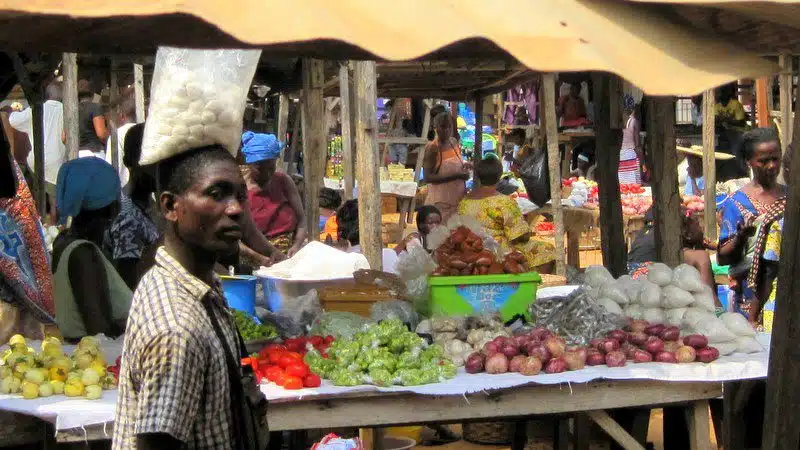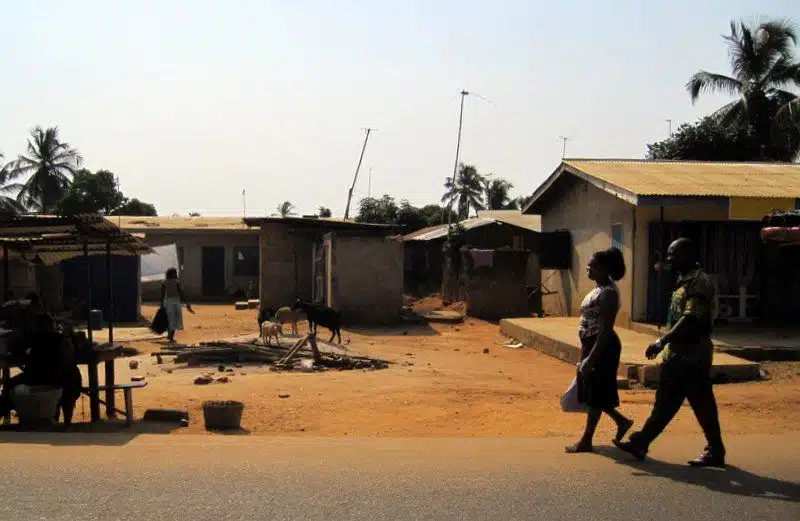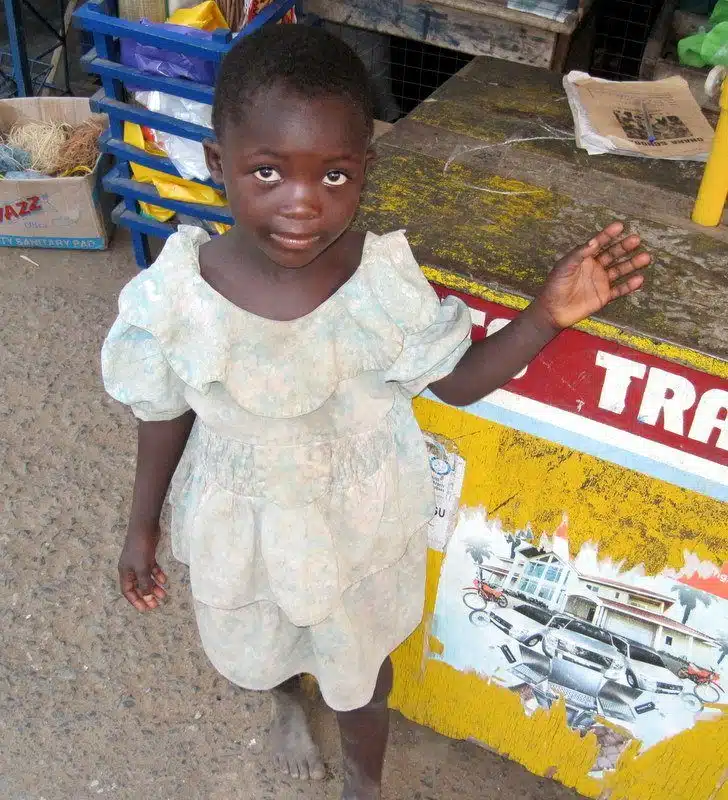
“We don’t mean it to be rude at all,” explained YCC teacher Derrick, smiling his luminous smile, “it’s just, you know, it’s unusual to see a pale person, and so the people get excited.”
YCC’s Director, John, laughingly explained at YCC orientation that volunteers will begin to think there is a national song in Ghana that goes something like this: “YEVUUUU!”
What does this strange howl mean? The answer is easy: “WHITE PERSON!”
My Brandt Guidebook claims that the literal translation of “Yevu” is “Trickish Dog,” though the author insists that the meaning is non-offensive.
Others claim that the term comes from a mangled interpretation of the Portuguese phrase for “Move along,” which was the main thing the Ghanaians heard the Portuguese imperialists say, back in the day.

Regardless, if you are a whitey like me, anywhere you walk in Ewe-speaking Ghana at any time of day, you will hear a child or adult holler: “YEVU!” every two minutes, minimum. If you are closer to Accra or in the Western region of Ghana where they speak Twi, the song will be switched to: “OBRONI!” and will mean exactly the same thing.
Sometimes I won’t hear it at first because it’s coming from so far away, but a chuckle from my Ghanaian walking partner will cause me to scan the horizon and see three tiny children waving wildly in the sun-baked distance yelling: “Yeeeeeeevuuuuu!”
Other times, the label is shouted right in your face, with swarms of children running right up to you, literally chanting in unison: “YEH-VU! YEH-VU! YEH-VU!” while trying to hold your hand or obtain some treats. The lead photo of this article was taken yesterday at just such a moment.

Among the Ghanaian yevu-yelling adults, there’s often a merry twinkle in the eye and a smile on the lips as they say, “Yevu! Eh Foa?”
“Eh Foa” is a test to see if you know how to answer the Ewe question for “Are you well?” If you correctly answer, “Ehhhh,” meaning “yes,” the speaker will often explode into happy laughter and applause.
At least once a day I hear a “Yevu!” holler followed by, “White man!” I am very much a woman, thank you very much, so I always kind of glare at that particular speaker, rapidly dropping my friendly wave until the speaker stutters, “White WOMAN! White WOMAN!”

Now here’s the hilarious cultural disconnect: every time the other volunteers and I try to explain to Ghanaian friends how UNHEARD OF it would be to do the equivalent “look at that unusual race!” thing in America, we are met with stares of utter confusion. The equation just doesn’t compute. Here’s how the conversation usually goes:
American: “If you came to America and were walking down a street filled with white people and every third white person yelled to you: “BLACK PERSON!!!” well, that would be absolutely AWFUL in our society! It just wouldn’t be allowed to happen! I think we’re trained from a young age that it’s offensive to draw attention to skin color.”
Ghanaian: “Really? Hm.”
American: “No, you don’t understand: it would be AWFUL.”
Ghanaian: “Hm.”
American: “No, SERIOUSLY!”
Note: as thoughtful readers might point out, though race is rarely explicitly called out in America, the judgments made with body language or subtle remarks sometimes seem to scream more loudly than an actual shout!
So how offended should we feel, being called “Whitey” by a hundred strangers a day? In reality, as Derrick wisely pointed out, “Yevu” in Ewe-speaking Ghana is just a good-spirited term of excited observation. In Ghanaian culture, the idea that such a shout might be seen as rude (oooh how it offends some volunteers!) is utterly alien.
In truth, hollering “YEVU!” upon spotting your first pale face in two weeks is akin to saying: “Hey– there’s a nice rainbow in the sky! Come look!” or perhaps, “What an amazingly strange looking trickish dog! Come check it out!”
Bow wow, tee hee hee, and long live our good-natured fascination with humanity’s variety!

The author, Lillie Marshall, is a 6-foot-tall National Board Certified Teacher of English, fitness fan, and mother of two who has been a public school educator since 2003. She launched Around the World “L” Travel and Life Blog in 2009, and over 4.2 million readers have now visited this site. Lillie also runs TeachingTraveling.com and DrawingsOf.com. Subscribe to her monthly newsletter, and follow @WorldLillie on social media!

Michael Redman
Monday 2nd of November 2020
My friend is Ghanaian and, when his baby son was introduced to me, the reaction was a loud scream! The poor lad had never seen a white face before! He must have thought he'd seen a ghost. A year or two later we played with his toys together, and he started to cautiously accept me as not so bad, after all.
I am, of course Obroni, nicknamed Obro -I'm proud of that. 'Officially', I am Kwame but that's rarely used. Living in the village, listening, seeing, and experiencing has been a real education for me. Things that my school years never taught me because my British education, in the 50's was so colonially/racist biased, perhaps unintentionally. The word 'natives' always seemed offensive... in retrospect. I love Ghana, and I have so much more to learn.
Lillie Marshall
Monday 9th of November 2020
Thanks for sharing your experience, Michael!
James Williamson
Sunday 11th of February 2018
There are a lot of women on Facebook from the Ghana Acca area and more that seem to be posing white female pictures on Facebook and saythere living in Ghana it makes no sense to me that there's so many black people and so many white beautiful women seem posting to be showing their picture on Facebook. are there really white beautiful women living in Ghana or is it just a scam that they want to get the American men's money
Lillie
Sunday 11th of February 2018
Hmm -- odd! I'm not sure, and hadn't heard about this before. Curious what you find out!
Mike
Friday 13th of January 2017
Exactly as you said. Just got back from 7 weeks in the Volta region. The adults yelled "Yevu" followed by "Woeson!" or "You are welcome here." And yes, when my wife started chatting with them in Ewe they cheered with delight. The young adults yelled "Yevu! Photograph?" and ran up to make selfies with us and carry our packages for us. And the wonderful children ran up to touch white skin and talk with us. No, we never gave them treats. That would not be a good thing to teach and Western candy is poison to a nation that doesn't have dentists because before development they never needed them. But we always laughed and talked, and asked the children's names, and learned to ask complete strangers "How is your family, your parents, your children, etc. just as they did." And we paid for the goods and services they sold. Took forever to walk through town but how wonderful to know there is such a place left in the world. Thanks for the pictures. Looks like the same kids we saw.
Kojo
Monday 10th of July 2017
> No, we never gave them treats.
I really ought to point out that Ghanaians have candy. We grow sugar cane---even, or rather especially in the bushlands far away from dentists. We certainly refine that sugar cane into sugar and make candy.
Sugar cane has been around since 800AD. That's certainly "before development" anywhere except China.
Lillie
Friday 13th of January 2017
This is so great to read! Thank you for sharing your beautiful experience!
Zariah W.
Monday 16th of November 2015
I don't think that pointing out skin color is absolutely an awful thing. If you are simply describing a person and using it as identification, but not being rude or judgmental, it is okay to bring it up. Skin color isn't always mentioned as something negative like most think. It is a part of your identity, and you should embrace it, not deny it. I'm shocked that people in the U.S. try so hard to avoid the topic and not point out the obvious differences among us. If it is true that, "all men are created equal", then why does it matter when people call you out on your skin-tone?
Margot W
Monday 16th of November 2015
I think this is really interesting and it shows a lot about other cultures. I find it interesting mainly that what may be considered completely normal in one place, may be insulting in another.